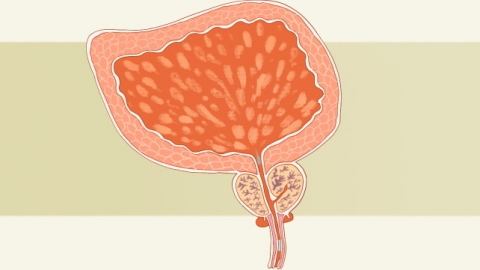What should I do about benign prostatic hyperplasia (BPH)?
Generally, benign prostatic hyperplasia (BPH) may be caused by factors such as aging-related hormonal imbalances, prolonged sitting that compresses the prostate, chronic prostatitis, bladder neck obstruction, and renal insufficiency. It is recommended to seek timely medical consultation to identify the underlying cause and improve the condition under a doctor's guidance through general management, medication, or surgical treatment. A detailed analysis is as follows:

1. Aging-related Hormonal Imbalance: With advancing age, men may experience an imbalance between androgen and estrogen levels. Androgens can stimulate prostate tissue proliferation, manifesting as frequent urination and difficulty urinating. It is advisable to avoid holding urine, maintain regular urination habits, and reduce fluid intake before bedtime. Additionally, consuming foods rich in lycopene and zinc, such as tomatoes and pumpkin seeds, may help regulate prostate function.
2. Prolonged Sitting Compressing the Prostate: Extended sitting continuously compresses the prostate, impairing blood circulation and exacerbating tissue proliferation. It is recommended to stand up and move around for 5–10 minutes every hour of sitting, choose soft and breathable seating, avoid sitting on hard benches for long periods, and engage in activities such as brisk walking or jogging to promote pelvic blood circulation.
3. Chronic Prostatitis: Long-term bacterial or non-bacterial inflammation can chronically irritate the prostate, causing tissue congestion and proliferation, often accompanied by perineal heaviness and discomfort, urgency, frequency, and pain during urination (urinary pain). Patients should follow medical advice to use medications such as levofloxacin hydrochloride capsules, azithromycin dispersible tablets, and Qianlieshutong capsules to reduce inflammation.
4. Bladder Neck Obstruction: Prostate enlargement compresses the bladder neck, obstructing urine outflow and causing urinary retention and interrupted urination. Patients should follow medical advice to use medications such as tamsulosin hydrochloride sustained-release capsules, finasteride tablets, and doxazosin mesylate sustained-release tablets to alleviate symptoms.
5. Renal Insufficiency: Long-term urinary retention increases bladder pressure, causing urine reflux and kidney damage, leading to renal insufficiency, manifested as lower limb edema and fatigue. Patients should first undergo catheterization to drain urine and relieve pressure on the kidneys.
Routine lifestyle adjustments include maintaining regular sleep patterns, avoiding late nights, keeping the perineal area clean to prevent infections, and maintaining a positive mood to reduce anxiety. Comprehensive lifestyle modifications can help alleviate symptoms of prostate enlargement and support urinary system health.





